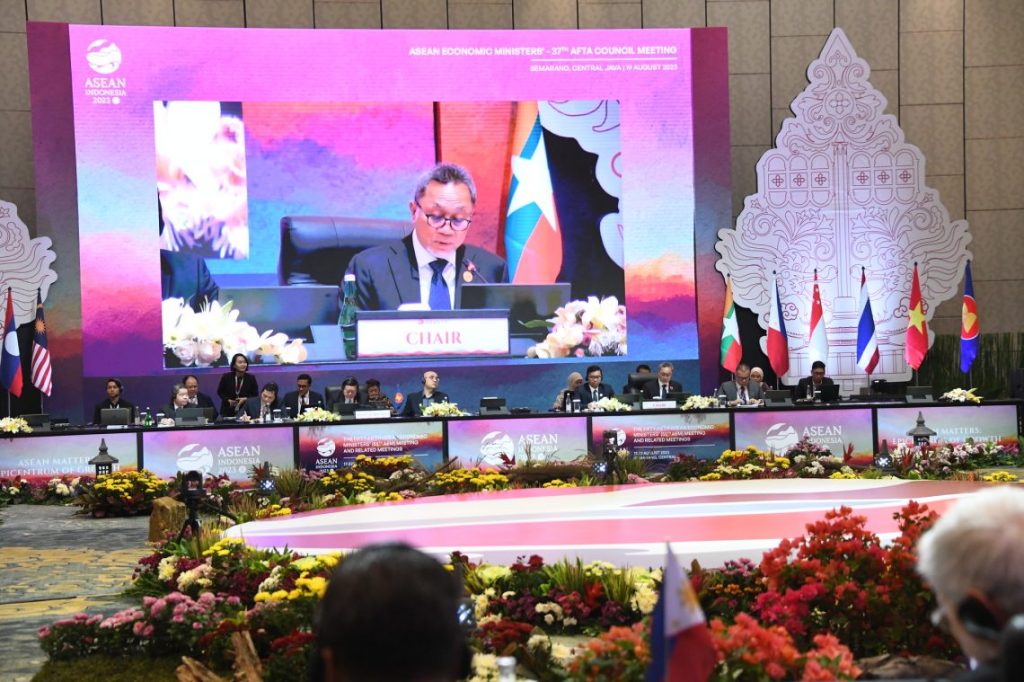Addressing ASEAN’s carbon burden will not only help mitigate these critical risks, but offer a path to unlock a significant socioeconomic opportunity…reports Asian Lite News
The Association of Southeast Asian Nations (ASEAN) is setting course for a carbon-neutral future, with ASEAN Economic Ministers today endorsing a visionary ASEAN Strategy for Carbon Neutrality. The Strategy is designed to complement the ASEAN Member States’ national initiatives in meeting their respective Nationally Determined Contributions under the Paris Agreement.
This ambitious strategy, commissioned by the ASEAN Member States and with the support from the Australia for ASEAN Futures (AUS4ASEAN) initiative, frames the need for ASEAN to pursue carbon neutrality with utmost urgency, and in doing so unlock the huge value potential of a green transformation of the region.
ASEAN is acutely exposed to climate change, with five of the world’s 20 most at-risk countries located in the region. Unchecked climate change could drive down regional GDP by 11% by 2100, and lead to displacement of 87 million people in high-risk flood areas in Indonesia, Malaysia, Myanmar, Thailand and Viet Nam.
Addressing ASEAN’s carbon burden will not only help mitigate these critical risks, but offer a path to unlock a significant socioeconomic opportunity. According to analysis conducted by Boston Consulting Group, driving towards a carbon-neutral future could unleash between US$3.0 and US$5.3 trillion GDP value-add by 2050, attracting a substantial US$3.7 to US$6.7 trillion green investment and unlocking between 49 and 66 million additional jobs for the ASEAN region.

Dr Kao Kim Hourn, Secretary General of ASEAN, emphasised that “ASEAN has reached an inflection point, where decarbonisation is paramount for the region’s continued economic growth. The ASEAN Strategy for Carbon Neutrality will provide the springboard to propel forward our green transition while unlocking huge economic potential for ASEAN’s citizens.”
The economic benefits of carbon neutrality would be accrued across all ASEAN member states. Cambodia, Lao PDR, Myanmar and Viet Nam are projected to enjoy the greatest uplift, ranging from 9% to 12% of GDP by the end of the century. Middle-income countries such as Indonesia, Malaysia, Philippines and Thailand would see an increase of 4% to 7%. High-income countries of Singapore and Brunei would enjoy a more modest uplift of 1% to 2%.
ASEAN needs to bridge a 2.6 gigatonne (GT) CO2 gap to achieve its carbon-neutrality goals, but has encouraging foundations to act. The region has one of the lowest CO2 emissions per capita globally, at just 3.9 tonnes of CO2 (tCO2) per capita, below the global average of 4.8 tCO2, almost half of that of China (7.1 tCO2) and less than a quarter that of the USA (14.0 tCO2).
ASEAN’s growing profile as an attractive financial location is creating an appealing investment environment, with total investment into ASEAN projected to grow at a compound annual growth rate of 12% between 2023 and 2030. This will double total capital from US$962 billion in 2023 to more than US$2.1 trillion by 2030.
The region’s diverse economies and markets provide a synergistic opportunity to progress a collaborative carbon-neutral journey. Hydropower-rich member states can contribute significant volumes of zero-carbon energy, some have strong raw material bases for production of green-technology nickel batteries, while others have robust foundations in automotive that could power up electric vehicle (EV) manufacturing opportunities.
The ASEAN Strategy for Carbon Neutrality aims to leverage these synergies, with a commitment to develop green industries, enhance ASEAN interoperability, embed globally credible standards and unlock green capabilities. The Strategy will reduce emissions across energy, industrial processes and agriculture sectors, among others.
Eight targeted strategies, where regional cooperation is most beneficial to complement the ASEAN Member States’ national initiatives, have been identified to deliver ASEAN’s carbon-neutral journey. They are to: (1) accelerate green value chain integration, (2) promote regional circular economy supply chains, (3) connect green infrastructure and markets (4) enhance interoperable carbon markets, (5) foster credible and common standards, (6) attract and deploy green capital, (7) promote green talent development and mobility and (8) offer green best practice sharing.
The Strategy outlines a nuanced approach that reflects the diverse resources and starting points of member states, defining sixteen initiatives to deliver on a carbon-neutral transition that will enable ASEAN to capitalise on the economic opportunities associated with carbon neutrality.
This transformative Strategy lays out ASEAN’s bold ambition to go beyond business-as-usual for economic integration, and strategically position the region favourably for a carbon-neutral future.
The Strategy now moves to adoption by the ASEAN Economic Community Council (AECC) and to be acknowledged by the ASEAN leaders at the 23rd ASEAN Summit in September 2023. It will then be introduced to the relevant ASEAN stakeholders from September 2023 onward, as the region continues to collaborate together on unlocking the value of a carbon-neutral future. (ANI/WAM)














